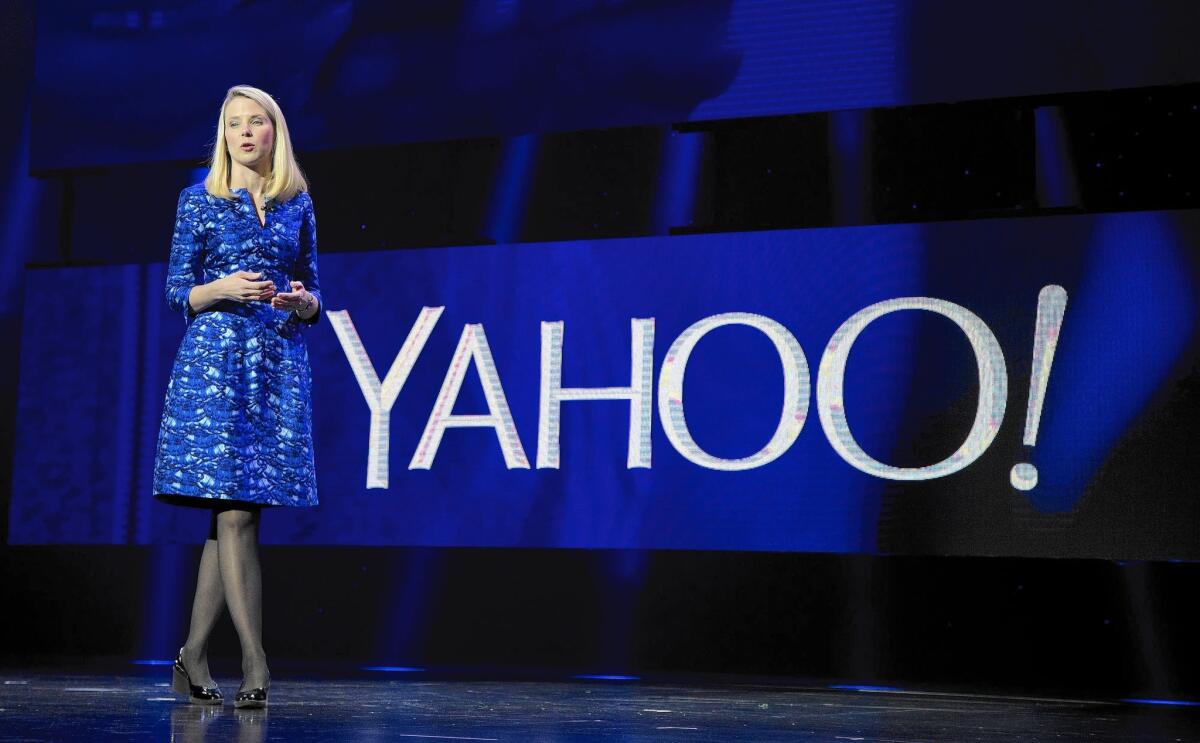How Mayer, a would-be savior, struggled to fix Yahoo’s identity crisis

- Share via
About 18 months into Marissa Mayer’s tenure at the top of Yahoo, she sat in front of an audience of angry employees and read a children’s picture book to them.
The moral of “Bobbie Had a Nickel,” a 1950s story about a child who chooses to spend his 5 cents on a merry-go-round, was far from clear to the audience.
They had put all their hope in the former Googler, who joined them in July 2012, to turn around their ailing, outdated Internet company.
Her public image was Vogue-posing glamourpuss bordering on tech superhero. Yet here, on the campus in Silicon Valley, she was awkward and perplexing — and starting to look as though she might disappoint them.
In “Marissa Mayer and the Fight to Save Yahoo!,” author Nicholas Carlson, chief correspondent for the news website Business Insider, has done a superb job of bringing to life the dramatic story of Yahoo and how 39-year-old Mayer is faltering in her role as its savior.
He unearths anecdotes such as the storytelling episode and new statistics, but above all, the book arrives just as Mayer’s “air cover” — as he puts it, in military terms — is fading.
The general enthusiasm for Yahoo’s stake in Alibaba, which went public in September, has ended, and investors are asking questions about Yahoo’s core performance.
To understand the present, Carlson dives into Yahoo’s history, to the days when its main purpose was to make the early Web easier to navigate. He shows how Yahoo’s organizational complexity came from the rush to keep up with the early Internet users.
In the book published by Twelve Books, Carlson also describes how Yahoo missed some of the biggest deals, not least turning down an offer to buy Google at $6 billion.
The lesson for Mayer is that Yahoo’s identity crisis — is it a media company or a technology company? — has deep roots.
Some of the challenges she faces now — what to do with Yahoo’s remaining stake in Alibaba, locked up until later this year, and the threat of attention from activist shareholders — are also not new for Yahoo, as Carlson points out.
The book is also good at trying to characterize Mayer — often an enigmatic figure — by looking at her early life, her research at Stanford and most important, her role as an early employee at Google.
Carlson points to her great successes: running an associate product manager program that developed talented employees; her idea for universal search, where images, maps and text all appear in the same page of results; and her eye for detail.
She works hard and cares about her company: when she joined Yahoo she set about correcting the many glitches in the way it was run, with remedies that included providing free food and longer maternity leave.
But Carlson does not hold back on her faults: She built a mini-empire at Google with only a few loyal lieutenants.
She often arrives very late for appointments and was famous at Google for making staff wishing to speak to her, however senior, line up outside her door. He also suggests she had weaknesses in terms of the Yahoo job: She had little experience in managing a unit or her own profit-and-loss statement and had never sold advertising.
The book returns to Bobbie and his nickel near the end, explaining that Mayer thought it was a way of telling staff that she was loving her time at Yahoo. Not surprisingly, the effect was just confusion.
Carlson’s corporate thriller ends with a cliffhanger, as Mayer hangs on to a slice of Alibaba to buy her more time for a turnaround. Whatever she does next, the story will be worth reading.
Hannah Kuchler is a San Francisco correspondent for the Financial Times of London, in which this review first appeared.
More to Read
Inside the business of entertainment
The Wide Shot brings you news, analysis and insights on everything from streaming wars to production — and what it all means for the future.
You may occasionally receive promotional content from the Los Angeles Times.









